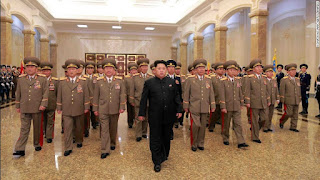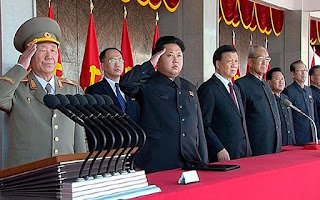The North Korean Hydrogen Bomb Brinksmanship
The
North Korean Hydrogen Bomb Brinksmanship
By E. Stanley Ukeni
Four years after his ascent to the helm of North Korea’s
leadership—following the abrupt death of his father, Kim Jong Il, it seems like
Kim Jong Un just decided to announce his supreme authority over the hermit
kingdom to the whole world, with the country’s sudden detonation of a hydrogen
bomb on Wednesday the 6th of January 2016.
His methodical campaign to establish his supreme reign over
a host of competing interests within both the powerful military cadre and the
country’s political leadership has been dramatically bloody.
Thought to be in his early 30s, Kim Jong Un took over the
leadership of the ruling Workers’ Party of Democratic People’s Republic of
Korea in late 2011, while he was still in his 20s.
He was often touted as possessing a supreme tactical genius
both in the arcane art of military and political maneuvering, while being
groomed as the heir apparent by his father. He has no doubt aptly demonstrated this
professed shrewdness since his ascension to the helm of North Korean
leadership.
Due to his youth and perceived inexperience some of the old
guards within the ruling Workers’ Party and within the ranks of the military
probably saw him as easily amenable to coercion—and thus figured that they
could easily exact control over the country by proxy.
Well, they were wrong…very wrong. The young Kim Jong Un
quickly moved against this emerging threat to his authority. He had his uncle,
Jang Song Thaek—the country’s then second in command, publicly shamed and then
executed for treason in December of 2013. The year before that, he purged his long
time mentor—the country’s army chief, Ri Yong Ho, from the North Korean armed
forces. Ho’s fate is still unknown to the outside world.
In 2014, a South Korean spy agency affiliated think-tank
speculated that Kim Jong Un had executed over one hundred of his nation’s
senior government officials in the process of consolidating his power. In one
of his most spectacular executions of a senior public official, the young ruler
had the country’s defense chief executed with an anti-aircraft gun for insubordination.
In fact, a recent car crash death of Kim Yang Gon—the top
official in charge of ties with South Korea, was deemed as suspicious by
various intelligence agencies because crashes have previously been documented
as an expeditious means of getting rid of undesirable.
The announcement on the 6th of January that North
Korea had conducted its first ‘successful’ miniaturized hydrogen bomb test came
as a concern to leaders around the world considering the antecedents of the North
Korean leader.
The underground nuclear test, which occurred at 10 a.m.
(8:30 p.m. ET Tuesday), corresponded with a magnitude-5.1 seismic event
centered 12 miles (19 kilometers) east-southeast of Sungjibaegam, according to
the U.S. Geological Survey.
The news was broadcast on the DPRK state-run television
station. The news broadcast revealed a copy of Kim Jong Un’s initial signed
order for the bomb test dated December 15, 2015. The broadcast also showed a second
order dated January 3rd 2016 in which the young North Korean leader
signed off on a final approval for the hydrogen bomb test to be conducted on January
6th.
In its broadcast, the North Korea’s official KCNA news
agency stated that, “The present-day grim reality clearly proves once again the
immutable truth that one’s destiny should be defended by one’s own efforts.”
The statement continued defiantly, “…The army and people of
the DPRK will steadily escalate its nuclear deterrence of justice both in quality
and quantity to reliably guarantee the future of the revolutionary cause.”
The KCNA statement further stated, “The spectacular success …
in the H-bomb test is a historic event of … national significance as it surely
guarantees the eternal future of the nation.”
In its official statement after the test, Pyongyang stated, “North
Korea not only has a legitimate right to have nuclear weapons, they are needed
as a deterrent to Washington’s deep-rooted harsh and…hostile policy.”
The handwritten approval message next to Kim Jong Un’s
signature—which looks more like an autograph from a rock star, than an official
presidential directive, has been translated to read, “Let’s begin the year of 2016…with
the cracking sound of our first hydrogen bomb explosion, so that the whole
world will look up to our socialist, nuclear-armed republic and the great
Workers’ Party of Korea.”
An expert on Korea and China at Seoul’s Yonsei University, John
Delury, describes the note’s message this way, “Let no one be confused; there
is no factional struggle; the military in not telling him what to do.”
We cannot be entirely sure that this analysis accurately
describes what is going on inside one of the world’s most secretive country. However,
I dare to speculate that the test may have been aimed primarily at reassuring
the North Korean citizenry that their leader is in complete control of the
affairs of the country at an important period in the nation’s history.
Then again, the fact that the announcement from the North
Korean state-run television station trumpeted that the country had country had
conducted a ‘miniaturized hydrogen bomb test’ means that the North Korean
leadership may have had the United States in mind in making the hydrogen bomb
declaration. This is because the technology for a miniaturized hydrogen bomb is
extremely complex, and difficult to master. A proven mastery of this multilayered
process means that their thermonuclear bomb can be made small enough to fit on
the tip of an Intercontinental Ballistic Missile—a troubling scenario I must
add.
Whatever the case maybe, the chorus of international
condemnation from world leaders was swift in coming.
The South Korean President Park Geun-hye said, “This is
clearly a provocation and threatens the lives and safety of people. We have
been continuously warning that (North Korea) will pay a price for conducting a
nuclear test.”
The Russia Foreign Ministry agreed, on Wednesday, that a confirmed
test of a hydrogen bomb by North Korea would amount to a gross violation of
international law.
“Such actions are fraught with further aggravation of the
situation on the Korean peninsula, which is anyway marked by very high
potential of military and political confrontation,” said the Russian ministry’s
spokeswoman, Maria Zakharova.
Even China spoke out strongly against the latest test, insisting
that it did not have advance warning of the test. NATO was equally strong in
its condemnation of the hydrogen bomb test.
“Today, North Korea, ignored the general objection from the
international community and conducted a nuclear test once again. As to this
matter, China strongly opposes,” a Chinese Foreign Ministry spokeswoman, Hua
Chun Ying, told reporters in Beijing.
“China will resolutely promote the goal of denuclearization
on the peninsula and stick to solving the peninsula nuclear issues through the
six-party talk framework,” she continued, referring to the long-defunct
multilateral talks aimed at persuading North Korea to give up its nuclear
ambitions for a number of international concessions.
On Wednesday, the 6th January, 2016, the United
Nations Security Council held an emergency closed-door meeting, no doubt, to
discuss punitive measures aimed at preventing Pyongyang from acquiring more
nuclear weapons, and to punish the country for the hydrogen bomb test earlier
in the day.
After the Wednesday’s meeting the 15-member U.N. Security
Council (which includes China, Russia and the United States) together condemned
the test as “a clear violation of past Security Council resolutions…and of the nuclear
non-proliferation regime”.
The statement from the Security Council continued, “…The
members of the Security Council also (express) determination to take further
significant measures in the event of another DPRK nuclear test. And in line
with this commitment and the gravity of this violation, the members of the Security
Council will begin to work immediately on such measures in a new Security
Council resolution.”
Japan’s ambassador to the United Nations, Motohide
Yashikawa, said his country was calling for a robust resolution to be adopted
swiftly.
Whatever the consensus the international community arrives
at, in dealing with the current crisis—through the framework of the Security
Council, I ague for a cautious approach to dealing with this North Korean
problem, so as not to exacerbate an already precarious situation. A war in the
Korean peninsula is the least desirable scenario for our world at this time of
intractable global economic and political flux.
Yes, North Korea must yield to international demands, but
how to go about this process must be tempered with caution. I am certain that
this is a calculated challenge by the North Koreans; the world must not be
lured into this trap—they have something more menacing up their sleeves.
This article is
authored and published by E. Stanley Ukeni. Copyright © 2016. All Rights
Reserved. This material and other articles or stories posted on this blog site
may not be reproduced, published, broadcast, rewritten or redistributed, in
whole or in part, without prior expressed written permission from the author,
E. Stanley Ukeni.







Comments
Post a Comment